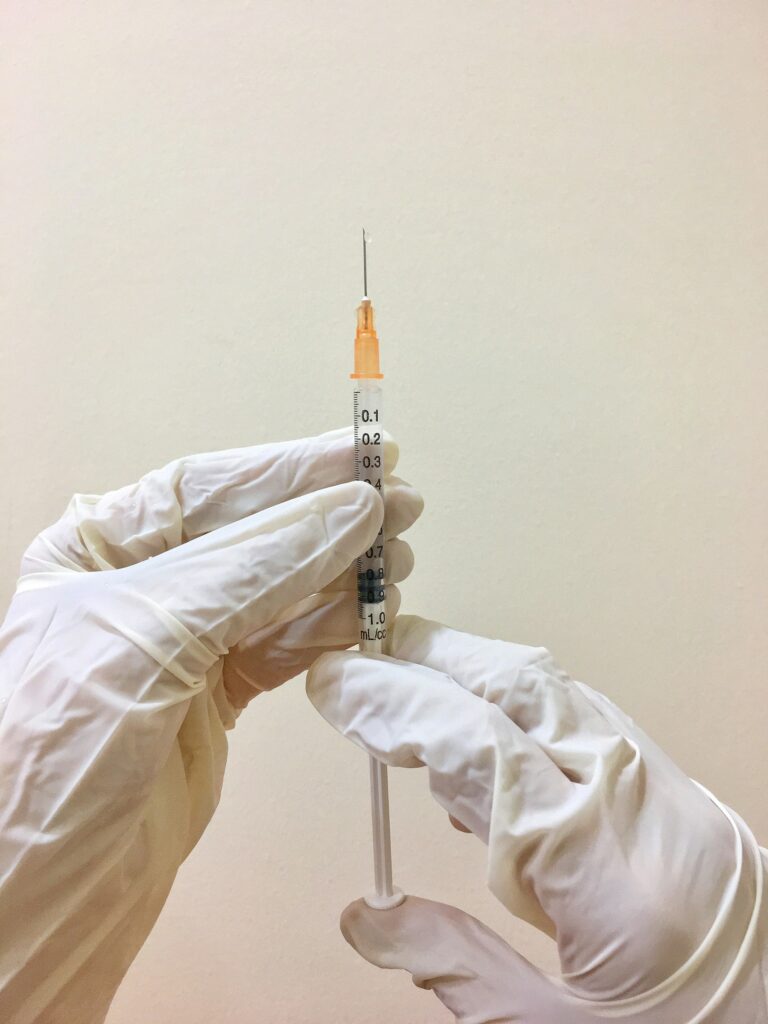Introduction to Chronic Weight Management
Chronic weight management requires a long-term, strategic approach that addresses not just weight loss, but the lifestyle and medical support necessary to sustain it. With obesity affecting more than 40% of adults in the U.S., the need for effective, science-backed treatments has never been greater. Among the most promising tools in this fight are weight loss injections, which offer both convenience and clinical results.
Before starting any weight loss injections or medications, it is important to consult a health care provider to ensure safe and appropriate treatment. Consulting with our team of experts will allow you to feel confident in your weight loss approach.
Medications such as semaglutide have been FDA-approved for chronic weight management in adults with obesity (defined as a BMI of 30 or higher) or overweight individuals with a BMI of 27 or higher who also suffer from weight-related conditions like hypertension or type 2 diabetes.
These injections are designed for individuals struggling with excess weight and the associated health risks. They can help people lose weight by reducing appetite and supporting calorie control, which can significantly reduce body weight and lower the risk of developing or worsening chronic illnesses.
At Mixx Health and Wellness, we provide affordable and personalized weight loss injection programs, including Semaglutide and GLP-1/GIP therapies starting at $100/month, helping patients regain control of their health through guided medical care and sustainable solutions.

Understanding Weight Loss Options
There are many pathways to weight loss, including lifestyle changes, medications, and surgery. The best strategy depends on individual factors like BMI, health status, and personal goals. Common weight loss options include:
- Diet and exercise: The foundation of any healthy plan.
- Prescription weight loss drugs: Like semaglutide, liraglutide, and tirzepatide. The active ingredient in these drugs works by suppressing appetite and improving satiety.
- Bariatric surgery: Often considered for individuals with a BMI over 40 or severe health complications.
- Behavioral therapy: To support sustainable habit change.
These drugs work by targeting appetite and metabolism, but may have side effects and should be used under medical supervision.
How Semaglutide Injections Work
Semaglutide is a GLP-1 receptor agonist that mimics a hormone in the body responsible for regulating appetite and glucose levels. It works by:
- Increasing insulin secretion: The drug helps the body produce more insulin in response to eating.
- Reducing glucagon production
- Slowing gastric emptying: This affects the stomach and helps control hunger.
- Suppressing appetite and cravings: It reduces appetite and increases feelings of fullness by acting on the brain’s appetite regulation centers.
Administered via weekly subcutaneous injection, Semaglutide helps patients feel full longer and eat less by helping regulate a person’s appetite. When combined with a reduced-calorie diet and regular exercise, this treatment can lead to substantial weight loss and improvement in conditions like fatty liver disease, high cholesterol, and insulin resistance.
At Mixx Health and Wellness, our programs are designed to make Semaglutide easy to access and use from home, with zero-cost consultations and provider support throughout your treatment.
Tirzepatide also acts on glucose dependent insulinotropic polypeptide receptors to further regulate appetite and blood sugar.
FDA Approval and New Medications
The Food and Drug Administration (FDA) approves new medications for weight management after rigorous evaluation. The FDA has approved several medications for weight loss in recent years. Notable treatments include:
- Semaglutide (Wegovy) – GLP-1 receptor agonist for chronic weight management
- Tirzepatide (Zepbound) – New medication; dual GLP-1 and GIP receptor agonist with even higher weight loss efficacy, recently approved for chronic weight management
- Liraglutide (Saxenda) – Daily injectable GLP-1 receptor agonist
Semaglutide was the first drug approved for chronic weight management since Saxenda in 2014, marking a significant breakthrough in obesity treatment.
These medications have been evaluated and approved by the FDA’s Center for Drug Evaluation and Research, as the FDA approves these medications based on clinical trial data showing significant weight reduction and improvements in cardiometabolic health markers.
New options continue to emerge, offering hope to individuals who haven’t found success with traditional weight loss methods.
At Mixx, we stay at the forefront of these innovations, offering customized treatment plans that evolve as new therapies become available.

Benefits and Risks of Weight Loss Injections
Other Medications and Alternatives
Additional weight loss treatments include alternative drugs such as:
- Orlistat – Reduces fat absorption in the digestive tract
- Phentermine-topiramate (Qsymia) – Appetite suppressant and stimulant combination
- Bariatric surgery – For individuals with severe obesity who do not respond to other treatments
Eligibility for prescription weight loss drugs often requires having a weight-related condition, such as high blood pressure, type 2 diabetes, or high cholesterol.
These options vary in effectiveness and risk. While orlistat is available over-the-counter, it may come with unpleasant gastrointestinal side effects. Phentermine-topiramate is more potent but can raise blood pressure. Surgery is highly effective but invasive and expensive.
No matter the method, lifestyle changes like diet and exercise remain essential. Even with injections, results are more sustainable when combined with holistic lifestyle support, which is built into every Mixx Health and Wellness program. If you stop taking weight loss drugs, it is important to maintain these lifestyle changes to help prevent regaining weight.
Ozempic and How It Works
Ozempic is a medication that contains semaglutide and is FDA-approved for treating type 2 diabetes. It helps regulate blood sugar by:
- Increasing insulin secretion
- Reducing glucagon production
- Slowing digestion to stabilize blood glucose levels
- Reducing blood sugar by promoting insulin release in response to high blood glucose
Ozempic works by decreasing appetite and slowing gastric emptying, which helps reduce hunger and food intake.
Although not officially approved for weight loss, Ozempic is often prescribed off-label for weight management due to its appetite-suppressing effects. Clinical results for weight loss are impressive, but because it’s not approved for obesity, insurance coverage may be limited unless the primary diagnosis is type 2 diabetes. When using Ozempic, it is important to monitor blood sugar levels to ensure safe and effective treatment.
Patients considering Ozempic for weight loss should discuss risks, alternatives, and coverage with a licensed provider.
Mixx Health and Wellness offers Wegovy (semaglutide) specifically for weight loss and helps determine the best plan for your health profile.

Diet and Exercise for Weight Loss
Despite the advancements in medication, diet and exercise remain the foundation of effective and sustainable weight loss. A good weight loss plan should include:
- A calorie deficit created through portion control, choosing healthy food, and limiting high fat foods to support weight loss
- Physical activity, such as cardio, strength training, and flexibility exercises, as well as exercising and increased physical activity as essential elements
- Lifestyle strategies like stress reduction, sleep hygiene, and hydration
Working with a healthcare provider ensures that your plan is customized to your needs, whether you’re managing insulin resistance, hormonal imbalance, or emotional eating. Guidance on food choices and physical activity is crucial for success.
Weight Loss Medications and Insurance Coverage
Insurance coverage for weight loss medications varies widely. Many insurers now cover:
- Semaglutide (Wegovy) – especially with a qualifying BMI and medical history
- Tirzepatide (Zepbound) – with similar criteria
- Other GLP-1 medications – sometimes covered off-label for diabetes, not for obesity
However, many insurance companies do not cover weight loss injections unless they are prescribed for underlying medical conditions such as diabetes. Some plans may still classify weight loss medications as “cosmetic” or “elective,” making it important to check your benefits ahead of time.
Mixx Health and Wellness makes pricing transparent and affordable—starting at $100/month with no hidden fees and no insurance required. We also help patients explore FSA/HSA reimbursement options and provide documentation for claims when appropriate.
Losing Weight with Weight Loss Injections
Weight loss injections are changing lives by making it easier to control hunger, improve metabolic health, and maintain motivation. Semaglutide and Tirzepatide, in particular, have helped thousands achieve:
- 10–22% reduction in total body weight
- Improved blood sugar, cholesterol, and blood pressure
- Increased energy, confidence, and quality of life
Ongoing medication use and lifestyle changes are essential to maintain weight loss and preserve long-term results.
To maximize these benefits, injections must be combined with a personalized plan that includes diet, exercise, and regular progress monitoring. Weight loss injections can help lower blood pressure, reduce the risk of heart disease and cardiovascular disease, and contribute to a reduced risk of serious health conditions. Individuals with certain health conditions, such as kidney disease or high blood pressure, may be at higher risk for complications and require close monitoring by healthcare providers.
At Mixx, our medical team provides ongoing support, unlimited follow-ups, and direct messaging access to ensure our patients are never alone on their journey.
Frequently Asked Questions
What is the best injection for weight loss? Currently, Tirzepatide (Zepbound) offers the greatest average weight loss, though Semaglutide (Wegovy) is also highly effective and widely used.
How much weight can I lose on Ozempic in 3 months? Users typically lose 5–10% of body weight within the first 12 weeks when following a comprehensive plan.
What is the drug injected to lose weight? Semaglutide (Wegovy), Tirzepatide (Zepbound), and Liraglutide (Saxenda) are the most common injectable weight loss medications.
Can you lose 20 pounds in a month on Mounjaro? While individual results vary, losing 20 pounds in one month is rare and depends on starting weight, adherence, and metabolism. Tirzepatide (Mounjaro) has shown strong results over several months, not weeks.
Who should not use weight loss injections? Approximately 70% of American adults are affected by overweight or obesity, but weight loss injections are not suitable for everyone. Individuals with a personal or family history of medullary thyroid cancer or multiple endocrine neoplasia syndrome type 2 should not use these medications, as they may increase the risk of thyroid cancer. Always consult your healthcare provider before starting any weight loss drug.
Conclusion and Next Steps
Weight loss injections have become one of the most reliable and accessible methods for achieving significant and lasting weight reduction. With FDA-approved options like Semaglutide and Tirzepatide, patients can see improvements not just in their weight but in their overall metabolic and cardiovascular health.
If you’re ready to explore whether weight loss injections are right for you, schedule a consultation with Mixx Health and Wellness today. Your transformation starts with one safe, strategic step.

